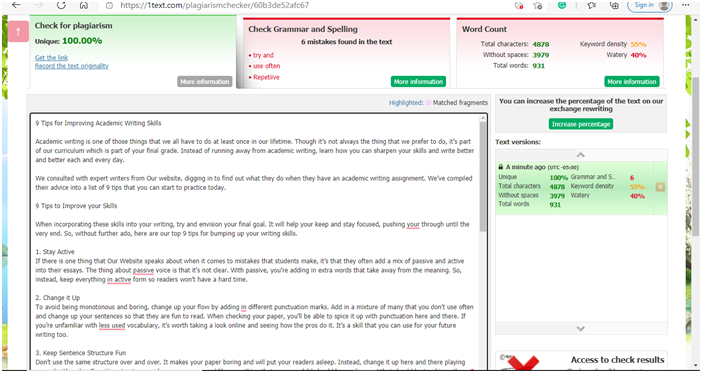9 Tips for Improving Academic Writing Skills
 Academic writing is one thing that we all have to do at least once in our lifetime. Though it's not always what we prefer to do, it's part of your curriculum, which is the necessary prerequisite of your final grade. Thus, instead of running away from academic writing, learn how to sharpen your skills and write better every day.
Academic writing is one thing that we all have to do at least once in our lifetime. Though it's not always what we prefer to do, it's part of your curriculum, which is the necessary prerequisite of your final grade. Thus, instead of running away from academic writing, learn how to sharpen your skills and write better every day.
We consulted with expert writers from Our website, digging in to find out what they do when they have an academic writing assignment. We've compiled their advice into a list of 9 tips that you can start to practice today.
9 Tips to Improve Your Skills
When incorporating these skills into your writing, try and envision your final goal. It will help your stay focused, pushing you through until the very end. So, without further ado, here are our top 9 tips for bumping up your writing skills.
1. Stay Active
If there is one thing that Academicsaviour speaks about when it comes to mistakes students make, it's that they often add a mix of passive and active into their essays. The thing about the passive voice is that it's not clear. With passive, you're adding in extra words that take away from the meaning. So, instead, keep everything in the active form so readers won't have a hard time understanding who did what.
2. Change It Up
To avoid being monotonous and boring, change up your flow by adding different punctuation marks. Add a mixture of punctuation methods that you don't use often and change up your sentences to be fun to read. When checking your paper, you'll be able to spice it up with punctuation here and there. If you're unfamiliar with less-used vocabulary, it's worth taking a look online and seeing how the pros do it. It's a skill that you can use for your future writing, too.
3. Keep Sentence Structure Fun
Don't use the same structure over and over. It makes your paper dull and will put your readers asleep. Instead, change it up here and there, playing around with the order. Repetitive structures make your paper sound like something that a young child should be reading, not a piece of competent academic writing.
4. Don't Be Choppy
Choppiness always takes away from the flow and the tone of your paper. If you have many short sentences that end abruptly, you run the risk of sounding more robotic than academic. Change it up and see how your tone changes. Fuse sentences together if you can and make things flow from one idea to the next to avoid choppy reading.
5. Don't Repeat Yourself
If you've said it once, you don't need to repeat it. The only time that repetitiveness is helpful is to add emphasis on ideas that you're sharing. Instead, you should avoid repetition and move on to the next topic within your essay. If you need to continue with an idea, make sure it's a different take on what you just said. One trick to avoiding repetition is creating an outline and staying on track with what you wish to say.
6. Use Consistency When You Can
Your paper should be one long idea that's solidified with examples and other sources to make your point clear. If you realize that some of your ideas, points, or language do not go with others, you should change or remove them. You want your academic essay to be read as one big piece of information, smoothly transitioning from one thought to another. If you added an idea that doesn't tie into your main idea, you might need to tweak it until it does.
7. Don't Use Pricey Words
As Lunwenzhushou experts say, vocabulary is something that should be used with respect. If you're using long words just to impress your professor, you may want to wait before you turn it in. That's because by using too many pricey words, you run the risk of sounding ungenuine. Instead, go for words that you know to ensure that you place them correctly within the content.
8. However, Don't Limit Yourself
Though you shouldn't overdo it, we are not saying that you should limit yourself. If you're in the mood to learn and expand your vocabulary, use new vocab to enhance your understanding and add new vibes to your paper. The trick is not to add too much, risking your paper's overall tone and flow.
9. Keep it Formal
The last thing that you need to ensure is keeping everything formal. An academic essay is not a creative essay and is not a place to tell stories. It's a place to discuss an idea and defend your thoughts with resources that help your readers see the subject from your perspective. So, keep it formal and don't use any slang.

Write Like the Pros
Writers at Our website know a thing or two about writing academic essays. They have been doing such work for many years and know what it takes to write academic pieces successfully. Take their word for it and change the way that you write. Your professors and readers will be happy that you did, and your grade will reflect it, too.

